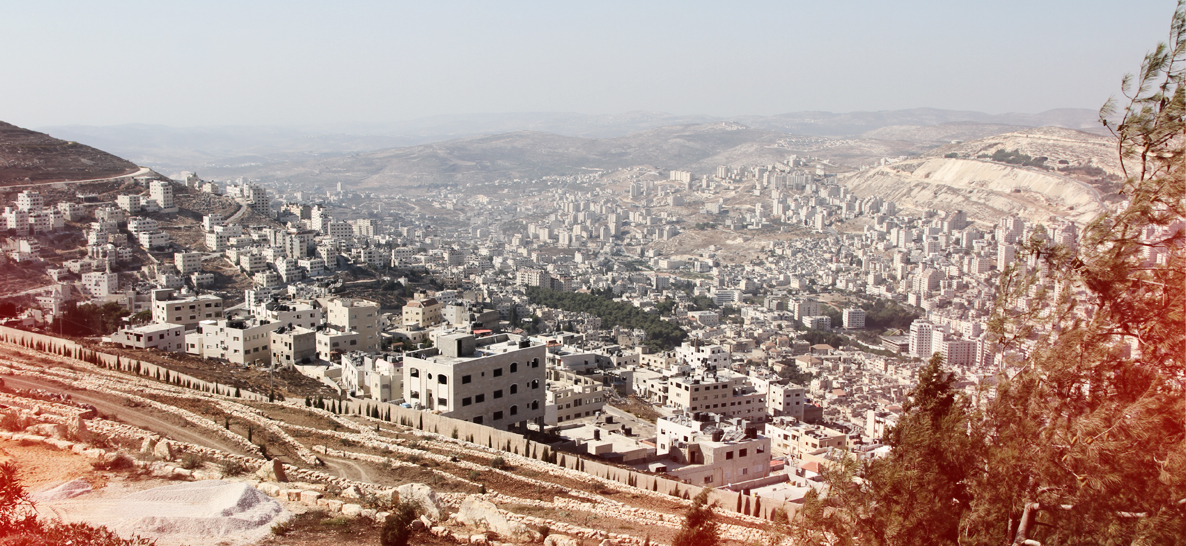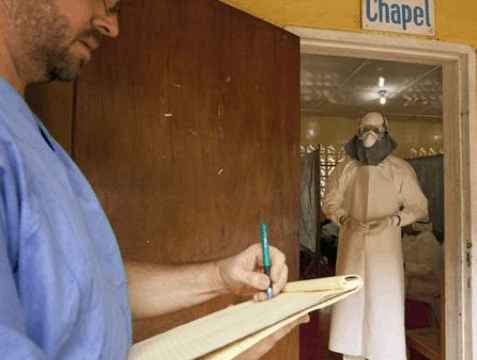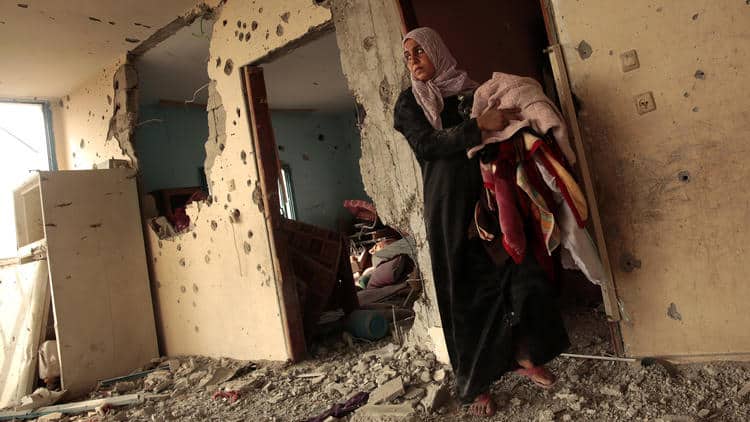
The conflict in the Holy Land is one of the world’s most divisive and complex issues. It periodically cycles in and out of the news, and rhetoric around the issue is often one-sided, confusing and heated.
Escalated violence in the West Bank recently brough the area back to to front page headlines, but it can be difficult to figure out exactly what is going on in the area and what it all means.
Todd Deatherage is the co-founder of Telos Group, a nonprofit dedicated to working toward peace in the Israeli/Palestinian conflict. We talked to him about what’s going on in Israel now, why it matters and how Christians should respond.
(For a more in-depth look at the history of the conflict, check out our March/April cover story, “Is Peace Possible?”)
Q: Can you give an overview of what’s going on right now in Israel and the Palestinian territories in Gaza?
A: Basically, right now at this moment we have a war going on between the government of Israel and a militant group that has been in charge of the Gaza strip, the Palestinian territory, an enclave on the Israel southern border called Hamas. We’re in our third week now of rockets coming out of Gaza onto not just southern Israel, but reaching into the central part of the country and even to the northern part of the country. And there’s an Israeli military response to that targeting much of the very densely populated Gaza strip. A lot of people have died in the last two or three weeks.
Q: It’s kind of normal for crude rockets to be launched from the Gaza strip into Israel. What is different about this time?
A: In some ways it’s not that different. Israel has had rocket fire emanate from Gaza for more than 10 years now. It flares up at different times and it goes quiet at different times. Israel has responded to that rocket fire with occasional military campaigns in 2012 and before that, at the end of 2008 or 2009 a massive campaign of aerial bombardment and ground troops like we’re seeing now.
Earlier on, rockets coming out of Gaza were very crude and things that were homemade. Over time, other weapons have been smuggled into Gaza and so you see more sophisticated weaponry coming out of Gaza with longer ranges. These are not precision guided instruments, so they’ve always been inaccurate, but they’re very terrorizing. And rather than terrorizing just the southern part of Israel, more recently they are now bringing that same sense of vulnerability to other parts of Israel, too.
The other thing that’s different is that Israel has developed a system called Iron Dome that intercepts rockets coming out of Gaza, and so most of the rockets that had been fired in this conflict within the last few weeks had been intercepted by Iron Dome. It’s proving very effective in meeting a lot of the rockets. But it still causes panic and terror and the sirens going off throughout Israel.
On the other side, you have a familiar bombing campaign going on in Gaza—a very densely populated area where the population has no bomb shelters and no place to escape. You have had high civilian casualties already in the last two plus weeks, from both the aerial campaign and the grounds campaign, which began a few days ago.
Q: Israel has Palestinian territory all around it, so why are the rocket attacks just coming from Gaza?
A: Palestinians live both in Israel proper—20 percent of the population of Israel itself are Palestinians, and those are citizens of Israel. Then you have Palestinians who live in the West Bank, which is the west bank of the Jordan river. And then you have Palestinians who live in Gaza.
For many years now there has been an international effort and an Israeli/Palestinian effort to negotiate a two-state solution that would create a Palestinian state, and that state would be based in what we call the Palestinian territories of the west bank and the Gaza strip. The two are geographically disconnected, but the difference between the two really goes back to more recent times in which there are two rival Palestinian factions: One is called the Fatah party—which has been the dominant Palestinian political force for many years and is the party that ultimately, in the late 1980s, made the decision to recognize Israel’s right to exist and to begin negotiating for a two-state solution. Their rival, Hamas, is an Islamic nationalist movement. It’s an offshoot of the Muslim Brotherhood. The Hamas objective is to not create a two-state solution, but to reclaim all of what they consider to be historic Palestinian land, which is all all Israel.
These two Palestinian factions actually engaged a civil war in Gaza in 2006 or 2007 after the Israeli military pulled out of Gaza in 2005 and left the Palestinian authority to be in control there. There was an inter-Palestinian civil war and the Hamas guys won, and so they have effectively controlled Gaza ever since then. So that’s the difference between Gaza and the West Bank.
Q: What should we keep in mind as we hear about the violence that’s happening over there?
A: First of all, keep in mind that not all Palestinians are in any way affiliated with Hamas. In fact, most Palestinians don’t support Hamas’ political platform. Most Palestinians support an effort to create a two-state solution. Missiles and other forms of violence aimed a civilian population are always wrong.
Secondly, too many children are dying in this conflict. The number of Palestinians who’ve died in Gaza since this all began totals at least over 100. There have been over 500 Palestinians who have been killed in the conflict so far. It’s hard to know how many are civilians and how many were militants or fighters, but U.N. estimates say that 75 percentof those who’ve been killed so far were civilians—including a large number of women and children.
Thirdly, expressing concern for or sympathy for the death of Palestinians civilians is not the same thing as expressing support for Hamas. We should grieve the loss of civilians anywhere. There have also been at least two Israeli civilians who’ve been killed in the conflict. There are as many as 30 Israeli soldiers who’ve died since the ground campaign began. We should grieve the loss of life regardless if they’re Israeli or Palestinian.
Then, ideologies or religious-based programs that call for the death or destruction of others must be countered. But then we have to ask, “What is the best way to do that?” I would suggest the best way to defeat groups likes Hamas is to vigorously pursue another alternative: a peaceful end to this long-running conflict. Because another thing to keep in mind is that there’s more to this story than the current round of violence. This is rooted in a history of a long conflict, and you can start peeling back layers of an onion until you get to where it all began, and that’s very difficult. Both sides will have a different beginning of the current round of violence and a different beginning of the whole conflict. But it’s really important to keep in mind that this is a long story that goes back at least 100 years, and you have to understand some of these fundamental causes that keep expressing themselves in these kinds of ways.
The final thing I’d say to keep in mind is most people on both sides do want this to end. You see people cheering it on on both sides right now, but I truly believe most people on both sides want all this madness to end, want to violence to end. And there’s at least hope in that.
Q: Do you think that there is a solution for lasting peace on the horizon?
A: Lasting peace is very difficult to achieve. The first thing I think that we have to look at is, how do we end the violence that’s happening right now? How do we deal with this?
I think a ceasefire is needed right now, and there’s an effort to negotiate one right now. America’s Secretary of State is in Cairo right now working with the Egyptians, the Palestinian leadership and talking to the Israelis. The Palestinian leadership is talking to the Hamas leadership, and so there’s an effort to try to arrange a ceasefire. That’s important. What’s lost when things like this happen are the human lives we’ve talked about, the infrastructure.
Gaza has been bombed and bombed again and again and there’s so much destruction in Gaza. But what’s also lost is any vision for a shared future, and with that comes prospects for peace. So what we really are losing in times like this is any sense of hope. And in moments of despair and hopelessness, people go in the opposite direction.
So what needs to happen is the calm has to be restored, violence has to stop, and at some point, we have to begin to imagine a different kind of future again and be listening to those groups and individuals on the ground. There are many on both sides who are arguing for a different way of doing this, a different way of living together, a peaceful solution that ultimately could be achieved if that was laid out as the vision for the people to work toward more than these kind of retalitory episodes of violence.
Q: What can Christians in the Western world do?
A: This is an important time to pray.
But it’s also an important time to do something Christians, particularly evangelicals, don’t always think to do: to lament. Some things are just really broken and are beyond immediate healing solutions. So, at some level, we just have to lament what’s happening there.
Another thing we can do is to become more informed and seek to understand. This is a very divisive issue. If you don’t believe me, post something about it on your Facebook page or say something on Twitter and you can start a war amongst your own family. And people think they know a lot about it, and sometimes they approach that from a very pro-Israel or pro-Palestinian point of view. But the reality is, people don’t know as much about it as they often think they do. So seek to learn more, and approach it with a bit of humility.
The fourth thing we can do is build relationships. Get to know some Israelis and some Palestinians. Share a meal with some people from different perspectives on this and see where that gets you. Because that’s a new way to gain insight into what’s going on there.
The fifth thing I’d say is embrace a Kingdom of God theology that calls those who follow Jesus to be about the business of healing and renewing and rebuilding a broken world. Rather than just fatalistically assuming war is just inevitable, let’s find ways to be about healing and rebuilding in difficult places like this. Wrestle with what Jesus meant when He said “Blessed are the peacemakers.” That’s a really hard thing to take on. What does it mean for us as Christians to engage in situations like this? There’s a different way we’re to live in a world that has really bought into the whole notion of an eye for an eye.






















